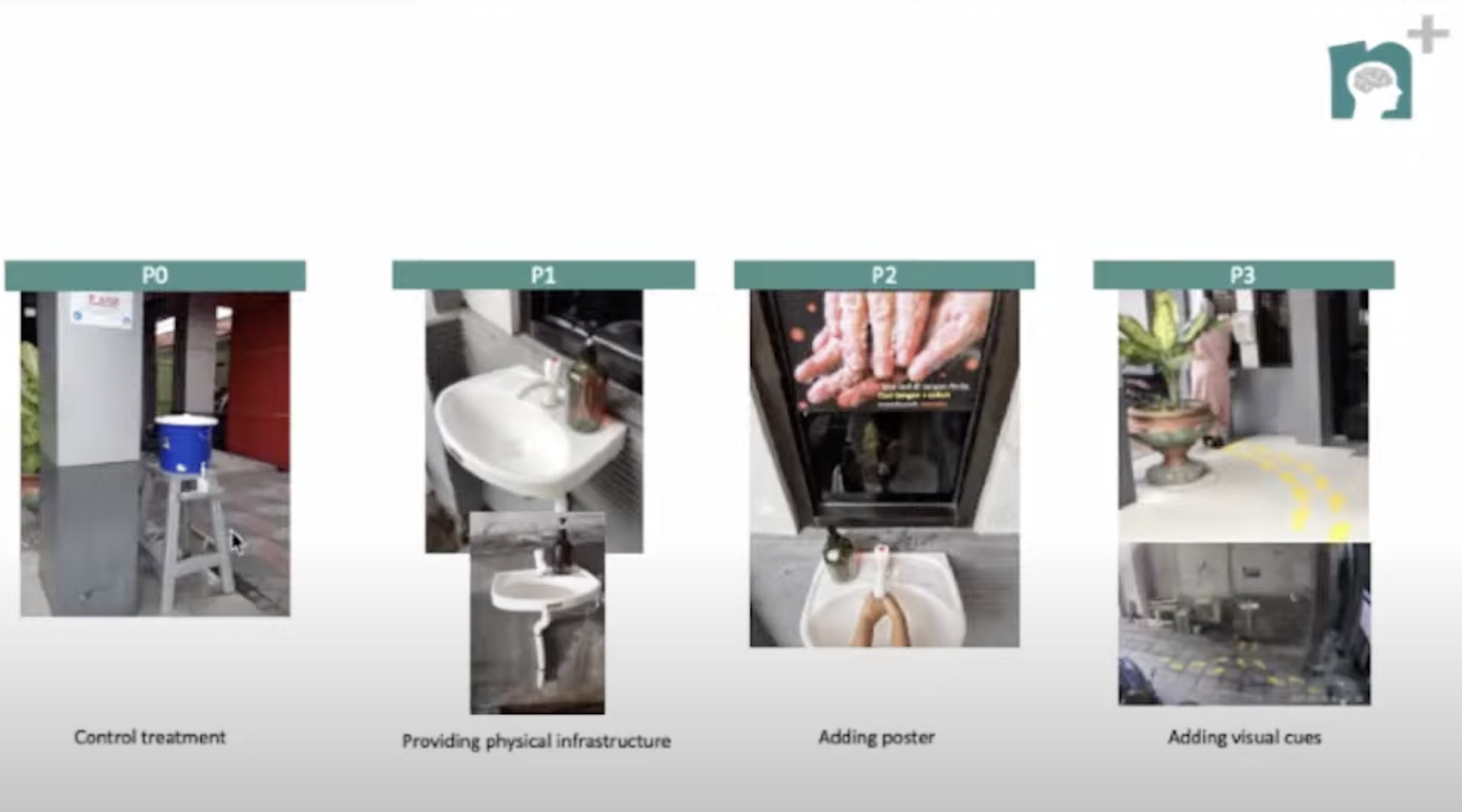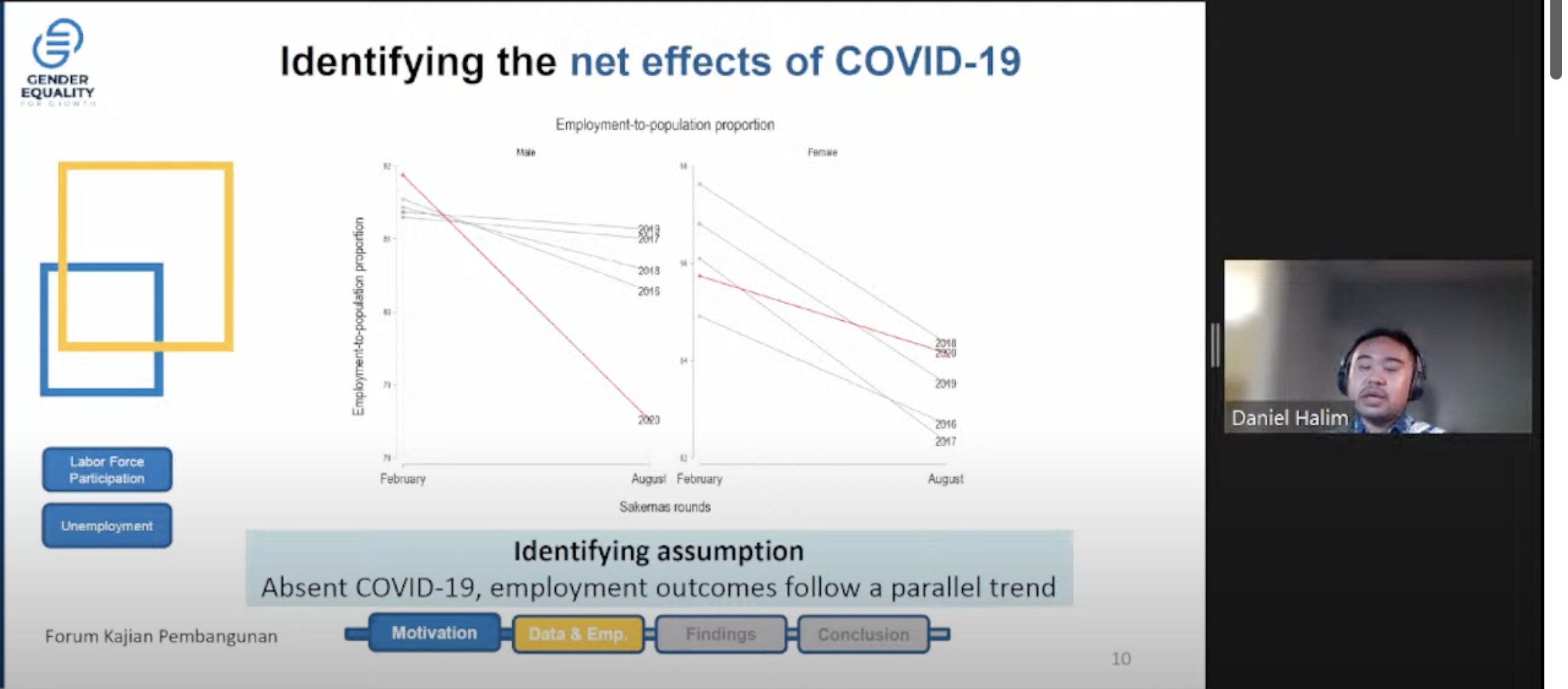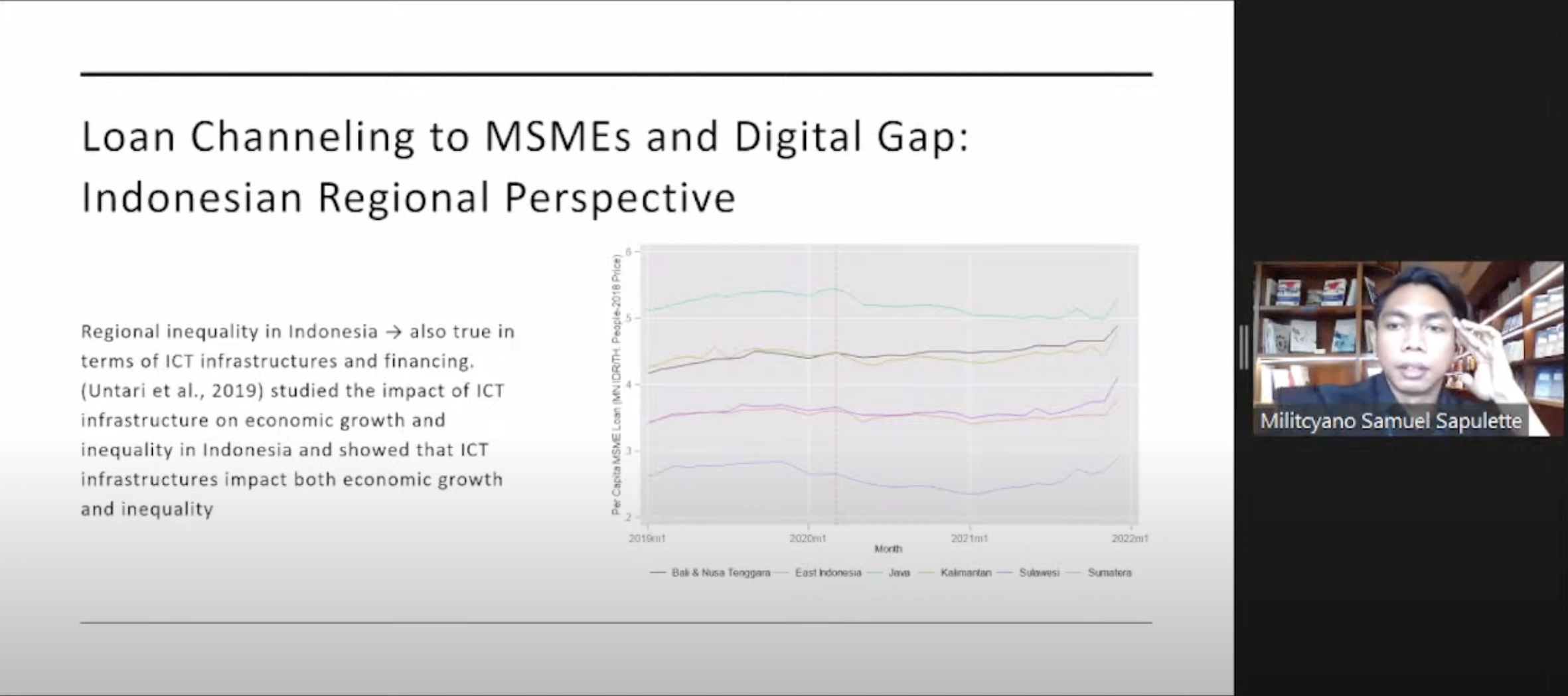FKP hosted by ANU Indonesia Project and IRSA with presentations by recipients of the 2022 IRSA-BKF Best Paper Award: Dimas Prasetyo (Nudgeplus), Daniel Halim (World Bank), and Militcyano Sapulette (ERIA). Tuesday, 9 August 2022.
KEY POINTS:
- This webinar featured the research on the impact of COVID-19 disruption in Indonesia that received the IRSA-BKF Paper Awards at the recent 17th Indonesia Regional Science Association Seminar (July 2022).
- The first presentation was by Dimas Prasetyo from Nudgeplus about the experiment of nudging people to wash hands during the pandemic. The study found that infrastructure provision is not enough to get people to wash their hands. Instead, a cost-efficient nudge intervention in the form of posters and salient cues succeeded in significantly increasing the handwashing.
- The second presentation was by Daniel Halim from the World Bank, talking about the narrowing of gender gaps in employment during the onset of COVID-19 in Indonesia. In contrast to empirical findings in the majority of other countries, this study observed that in Indonesia the onset of the COVID-19 pandemic increases the likelihood of being employed among women. It has narrowed the gender gap in employment participation in Indonesia, due to female added-workers.
- The last presentation was by Militcyano Sapulette from the Economic Research Institute for ASEAN and East Asia (ERIA) on the role of digital environment on MSMEs credit channeling. The study found that the digital environment has evolved to become a significant factor affecting MSM loan channeling. This means that regions with significantly poor digital environments will face hardships in securing MSME credit, thus hampering its future growth.
SUMMARY
- This webinar featured the research on the impact of COVID-19 disruption in Indonesia that received the IRSA-BKF Paper Awards at the 17th Indonesia Regional Science Association Seminar held in July 2022. Mahpud Sujai from Badan Kebijakan Fiskal delivered remarks at the opening of the webinar, noting that the best papers were chosen by a team at BKF for their policy relevance. The collaboration between BKF and IRSA can be a constructive bridge between policy makers and researchers in developing evidence-based policies.
- The first presentation was by Dimas Prasetyo from Nudgeplus on the experiment of nudging people to wash hands during the pandemic.
- Little attention is paid to using behavioral science to impose health protocols. Meanwhile, there has been growing recognition of behavioral economics intervention, especially nudge. In this study, researchers used posters as a nudge, where the participants were exposed to the posters as visual stimuli and the researchers assessed their intention to hand wash and use soap before and after exposure to the stimulus. Furthermore, the experiment also provided a permanent hand wash facility, with nudging posters and salient cues leading to the facility.
- The study found that visual priming (through posters) of handwashing with foam and of rhyming messages can lead to higher handwashing intention. Another important finding is that infrastructure provision is not enough to get people to wash their hands. Instead, a cost-efficient nudge intervention in the form of posters and salient cues succeeded in significantly increasing the handwashing rate to 29% (almost double the incidence rate in the baseline).
- The second presentation was by Daniel Halim from the World Bank, talking about the narrowing of gender gaps in employment during the onset of COVID-19 in Indonesia. The study analyzes the impacts of the COVID-19 pandemic on Indonesia’s labor market by exploiting the exogeneous timing of the pandemic in a seasonal difference-in-differences framework.
- In contrast to empirical findings in the majority of other countries, this study observed that in Indonesia the onset of the COVID-19 pandemic increases the likelihood of being employed among women while men of all ages become less likely to be employed during the pandemic. The increase in women’s employment is proportional to women entering the labor market for the first time. It has narrowed the gender gap in employment participation in Indonesia, due to female added-workers.
- However, these new female entrants are mostly women in rural areas without high school education, entering informal, agricultural employment, or unpaid family work. COVID-19 therefore lowered the overall employment quality, as women (and men) turned to the informal sector, especially agriculture. Women and men also worked fewer hours and earned less due to the pandemic.
- The last presentation was by Militcyano Sapulette from the Economic Research Institute for ASEAN and East Asia (ERIA), talking about the role of digital environment on MSMEs credit channeling.
- The COVID-19 pandemic has brought new challenges and opportunities to the economy, one of which is the acceleration of economic digitalization. This might be an opportunity for tech-savvy businesses, but the opposite for others. The lack of digitalization of MSMEs (as one of the significant contributors of Indonesia’s GDP and employment) post-COVID-19 may thwart Indonesia’s economic recovery strategy.
- Affordable financing is one of the prerequisites for MSMEs’ growth. The pandemic may have seen unequal credit channeling to businesses that are not digitized, further hampering recovery efforts and widening the inequality gap. Regional inequality in Indonesia is also true in terms of ICT infrastructures and financing, where ICT infrastructures also impact both economic growth and inequality.
- The study found that the digital environment has evolved to become a significant factor affecting MSMEs loan channeling. This means that, as we move away from the pandemic into an unprecedented digital era, regions with significantly poor digital environments will face hardships in securing MSME credit, thus hampering its future growth, starting from the growth of MSMEs. Implicatively, these regions will likely be the provinces outside Java, thus worsening Indonesia’s inequality problem.








